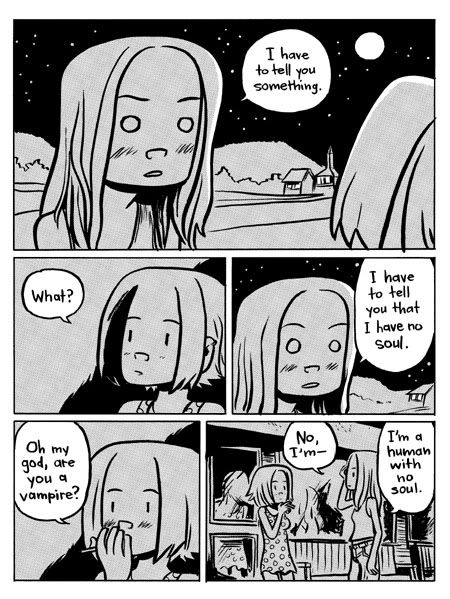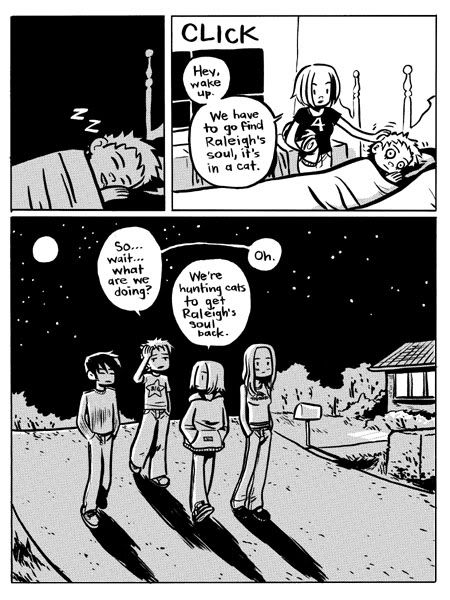 Talk about catching up... Bryan Lee O'Malley's first book, Lost At Sea, pre-dates his popular Scott Pilgrim series, having originally been released in 2003 (making it just about as old as VFH!). But despite that fact, I didn't manage to read Lost At Sea until now, which makes it a pretty interesting book after having read the five Scott Pilgrim books.
Talk about catching up... Bryan Lee O'Malley's first book, Lost At Sea, pre-dates his popular Scott Pilgrim series, having originally been released in 2003 (making it just about as old as VFH!). But despite that fact, I didn't manage to read Lost At Sea until now, which makes it a pretty interesting book after having read the five Scott Pilgrim books.Story
Lost At Sea follows Raleigh, and 18 year old girl who has been on a road trip with three fellow high school classmates whom she barely even knows. She is a quiet girl, with thoughts she rather keep to herself. Like how she believes she has no soul, and if she does, then it's inside a cat somewhere. What's she doing here?
 When you get down to it, Lost At Sea is a purely existential story. You have you mysterious lead character, the character's sense of (lacking actually) purpose, and supporting characters who are just as mysterious because the lead has no clue of who they are. In short, if you've read an existential novel, there is really anything new here. But those, like myself, looking for more Scott Pilgrim-type wackiness, won't find it here.
When you get down to it, Lost At Sea is a purely existential story. You have you mysterious lead character, the character's sense of (lacking actually) purpose, and supporting characters who are just as mysterious because the lead has no clue of who they are. In short, if you've read an existential novel, there is really anything new here. But those, like myself, looking for more Scott Pilgrim-type wackiness, won't find it here.Writing
Unlike the Scott Pilgrim books that O'Malley would write after this, Lost At Sea is its own self-contained book; though it is in the same manga size that O'Malley continues to work with. With this, it should be noted that Lost At Sea also doesn't have any chapter breaks, so it really ends up being a book that's best left to read in one sitting.
 Personally, I wasn't a huge fan of Lost At Sea's writing. Not that it's bad, but the whole 'existential 18 year old girl' isn't exactly as relatable a topic as say, Scott Pilgrim's nerd-centric humor/action/love story. But what I can appreciate is Bryan Lee O'Malley's writing range, because when you read Lost At Sea and Scott Pilgrim, in either order, it's as if two completely different people wrote the books, which is a nice quality I think, as it certainly shows development.
Personally, I wasn't a huge fan of Lost At Sea's writing. Not that it's bad, but the whole 'existential 18 year old girl' isn't exactly as relatable a topic as say, Scott Pilgrim's nerd-centric humor/action/love story. But what I can appreciate is Bryan Lee O'Malley's writing range, because when you read Lost At Sea and Scott Pilgrim, in either order, it's as if two completely different people wrote the books, which is a nice quality I think, as it certainly shows development.Artwork
This part of the book was the most interesting aspect for me, because particularly, like the writing, it shows a lot of improvement and development when you look back at it. As noted in my reviews of the Scott Pilgrim series, O'Malley's style in those books never leaps in terms of style from one book to the next; for the most part, the artwork is pretty consistent.
 But when you look back at Lost At Sea, you really get a feeling for where O'Malley started and where he is now. In terms of style, Lost At Sea clearly looks like O'Malley's work, but at the same time it's not quite at the big-eyed, poppy style that the Scott Pilgrim series is known for, further distinguishing the books, which is a good thing.
But when you look back at Lost At Sea, you really get a feeling for where O'Malley started and where he is now. In terms of style, Lost At Sea clearly looks like O'Malley's work, but at the same time it's not quite at the big-eyed, poppy style that the Scott Pilgrim series is known for, further distinguishing the books, which is a good thing.Overall
If you couldn't tell by my writing, I'll just tell you now, if it wasn't for enjoying Scott Pilgrim, I probably would have never even though to pick up Lost At Sea. So if it seems like you're seeing "Scott Pilgrim" more than "Lost At Sea," there's a reason for that. But overall, I'm pretty please with Lost At Sea, and I'm glad I read it, because I feel that it's good to know where an artist (whether it be comics/film/music/etc) comes from in terms of development. And I think that alone is what makes Lost At Sea such an interesting book, even if it doesn't live up to O'Malley's most recent work.
Overall Score: 7.8/10
For more on Bryan Lee O'Malley visit: radiomaru.com


























2 comments:
A great deal of worthwhile data for me!
I consider one and all should look at it.
Post a Comment